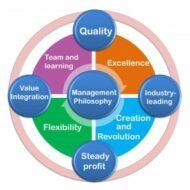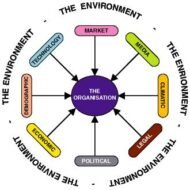Posted by Managementguru in Business Management, Organisational behaviour, Principles of Management
on Mar 6th, 2014 | 0 comments

Corporate Philosophy of Management CORPORATE PHILOSOPHY OF MANAGEMENT calls for creating a framework of values, beliefs and ethical standards which are considered to be vital for an effective management. They must be embedded in formal and informal philosophical statements which are then communicated to the fraternity of that organization. From a broader perspective, the LEADER has to have a VISION as to where he is heading his company in the next three to four years. Corporate Objectives provide vision as well as direction and map for bold decisions to be taken regarding NEW MARKETS MARKET SHARE PRODUCTS SERVICES etc. , Now the organization is in a position to decide and prioritise the VALUES AND COMPETENCIES it expects from its managers. For example, if the situation favors the business expansion to new markets, say, European or Asian, then an organization has to develop competence in areas like LANGUAGE AND CULTURE, besides marketing and business skills. Different Philosophies of Management: Well, you might have been inspired with JAPANESE PHILOSOPHY OF MANAGEMENT, EASTERN OR WESTERN PHILOSOPHY OF MANAGEMENT t. But what is the fun? If you don’t have A SOUND MANAGEMENT PHILOSOPHY of your own, to simply put it, you don’t have a broad set of principles to back up your management development process which is a generic one. Ideally speaking, you should be able to develop a concrete SYSTEM that is made up of FOOL PROOF policies and procedures; try to develop a professional team of executives who can take up your vision to the next level; these measures will prove worthwhile in the long run. You are left without any choice but to develop “truly” INTERNATIONAL MANAGERS who could transcend nationally and the location of any specific job consideration. This is what Ideal management philosophy means to me, A holistic vision of the future A solid set of principles(values, beliefs) Sound policy definition Management development programmes Autonomy to my work force Always “yes “to new technology Development of women managers Flexible leadership Social responsibility Contribution to the growth of my Country’s economy Strategic Perspective: Major environmental shifts now demand a more strategic perspective from those who manage and lead in organizations; “GLOBALISING” in the quest for major market share brings in new opportunities for growth and prosperity. Organizations are now espousing values that regard people, not as costs to be minimized, but AS “ASSETS TO BE MAINTAINED AND DEVELOPED.” An open systems approach of management is likely to overcome many of the problems created by the piecemeal approach. Instead of looking at management development in isolation, see it as an integral part of a wider organizational system that takes care of the processes through which people working for the firm take care of themselves leading to self...

Posted by Managementguru in Business Management, Principles of Management
on Feb 26th, 2014 | 0 comments

Factors of External Environment of Business What do you mean by Business Environment: The sum total of all things external to firms and industries that affect the functioning of the organization is called Business Environment. Elements of Business Environment 1. ECONOMIC 2. SOCIAL 3. CULTURAL 4. POLITICAL 5. LEGAL 6. TECHNOLOGICAL 7. DEMOGRAPHIC 8. GEOGRAPHICAL 9. ECOLOGICAL 1. Economic Environment This refers to all economic factors that influence and affects the very survival of an organization. Can be classified into · Economic factors affecting demand · Competitive forces Economic factors affecting demand The existence of an organization depends on the demand for its products or services. The customers’ ability to buy and willingness to pay determine the demand factor. The buying power is determined again by · Employment · Income taxes · Saving and · Prices The money acquired by an individual through employment is utilized for paying taxes which is the first priority and then comes saving or spending. In developing countries like India, much importance is attached to the habit of saving in the form of insurance policies or mutual fund deposits or investment on immovable assets. This makes the economy strong and stable even during times of recession, whereas we witness the economy of some developed countries entirely shaken when there is an economic depression. Sub Prime Lending Sub prime lending may prove to be disastrous for a growing or grown nation when the money is lent by the banks to third parties without proper securities or collaterals. While the initiative is intended to increase the growth rate or GDP, the end result may not live up to the expectations when the money is parted to individuals or firms with poor financial credentials. Disposable Income Disposable income also decreases when the tax rate increases and his/her ability to buy is reduced. Equally important is the willingness to by because the fact that an individual has the ability does not mean that he or she will buy. Willingness is affected by the preferences for products and the expectation about future factors like the price fluctuation, increase in one’s own income, general economic trend and so on. Competitive forces Firms have to first survive in order to succeed in the market. To accomplish this they exert competitive force on each other through one or the other following methods. · Price cutting · Promotion-advertising, personal selling · Design, feature and packing · Number and type of customer services offered give a cutting edge to firms competing in the race. 2. Social and Cultural Environment The social environment depends upon the · The class structure · Mobility · Nature of the social organization and · Development of social institutions People always have the unending desire to move from one occupational category to another and this is the main reason for high job turn over in IT industries for various reasons like pay, promotions, job satisfaction etc., This is the same reason which can be attributed to the failure of many good projects that go underway due to lack of continuation of the same initiative with which it was started. The above said process is more prevalent in urban societies than rural where scope of mobility is much the less among farmers, artisans and those engaged in traditional crafts and cottage industries. 3. Political Environment A smart manager has to be on tenter hooks to gauge the trends in political scenario that directly or indirectly affect the functioning of the firm. The political weather is highly unpredictable and may be classified into · Long-term changes · Quick changes · Cyclical changes · Regional changes Now-a-days we see that the economic depression in...




